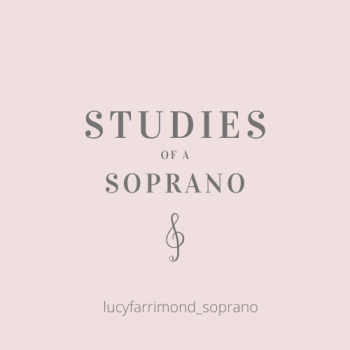In the third episode of the ‘Student Stories’ series, I chat to the wonderful Olivia Rose Tringham – Soprano. It was such a privilege to talk to Olivia about her life and vocal journey. If you have any questions for myself or Libby, please get in touch.

Biography
Originally from Merseyside, Olivia is a Royal Northern College of Music graduate, currently singing spinto soprano repertoire. At the RNCM, Olivia has played Mère Marie in Poulenc’s Dialogues des Carmélites, La Suora Infermiera in Puccini’s Suor Angelica, Sally in Baraber’s A Hand of Bridge and Fanny Price in Dove’s Mansfield Park. She has also performed opera scenes from Menotti’s The Old Maid and the Thief, Flight by Jonathan Dove and Vaughan William’s Sir John in Love. Olivia has a natural draw to character driven music and particularly enjoys tackling musically challenging repertoire.
Professionally, Olivia was due to perform in the 2020 Buxton International Festival as one of their Young Artists, performing as Mrs Segstom in A Little Night Music by Sondhiem and as chorus in Rossini’s La Donna Del Largo. Olivia was also due to be a part of the Wexford Festival Opera Chorus with a step-out role in Catalani’s Edmea and roles in their pocket opera The Dark Side of Shakespeare. However, these two festivals were cancelled due to COVID-19 restrictions. Olivia has recently set up independent opera company ALLO Opera, with the aim of giving Young Artists performance opportunities during the coronavirus pandemic. ALLO Opera have produced a series of recorded virtual Galas with extremely talented young artists, are producing a recorded live, fully staged version of Mozart’s Don Giovanni in July, in which Olivia will play Donna Elvira. ALLO Opera has built and online community of young artists, and are trying to re-write the way that young artists think they have to portray themselves online.
Olivia holds many teaching and conducting posts, leading adults, children and young people alike. She regularly works for Stagecoach Northwich, Holy Innocents Church of England Fallowfield and East Cheshire’s Musical Theatre Company. With ECMTC, Olivia project-managed, taught and conducted the successful Classical Crossover series, aiming to showcase the accessibility of classical music to musical theatre singers and audience members.
Outside of musical work, Olivia has had what she calls ‘character building jobs’ in almost every industry, from hotels to bookmakers, call centers to the Amazon warehouse. Due to the COVID-19 restrictions, she has been unable to return to the RNCM this year. Olivia also started her running journey this summer, having never ran before, on the #Couchto5Kapp. She is now working towards running the Vitality Big Half Marathon in April 2021, raising money to continue her studies.
Olivia’s Top Tips!
- Get Comfortable With Being Uncomfortable: Be as open as you can.
- Take the Risks and Do the Things: Do as much as you can and get as much out of the situation as you can.
- Be Nice: You will have a much nicer time if you are nice to people. That is how you make those lasting connections. Nobody is going to be perfect – so just be nice!
It was such a privilege to talk to Olivia about her life and vocal journey and I would like to thank her for sharing her time with us. If you have any questions for Libby or myself, please do not hesitate to get in touch!
Stay tuned for more podcasts coming your way!
Lucy















